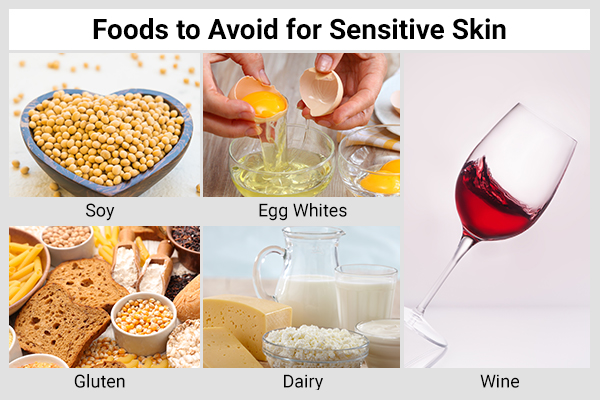In this article:
If you frequently experience redness and rashes or feel an itchy or burning sensation on your skin after eating certain foods or using a new cosmetic product, you likely have sensitive skin.

By definition, sensitive skin is a sensory reaction triggered by environmental factors (such as exposure to the sun, heat, pollution, and moisture) or other things that come in contact with the skin. It may also not have a clinical appearance. (1)
People who suffer from sensitive skin often complain of: (1)
- Itching
- Burning
- Tingling
- Thickening of the skin
- Dryness
This condition is also referred to as sensitive skin syndrome (SSS) and is studied mainly because of surface triggers such as creams, moisturizers, and other facial products. (1) Certain foods can also act as triggers.
Foods to Avoid for Sensitive Skin
Skin allergies and skin sensitivity may seem similar, but they are not. Allergies are usually a response of the immune cells to a trigger and manifest very visibly, (2) but sensitive skin is not always visible or aggressive. However, they both may have similar triggers.
If you do have sensitive skin, avoid these foods.
1. Soy
Though soy is a healthy food and offers a variety of benefits, in people who have sensitive skin, soy can induce hives or skin dermatitis, causing raised itchy patches. (3)
In addition, certain types of processing on soy such as fermenting can also increase its risk of causing hives on the skin. (4)
2. Egg whites
Egg whites contain most of the egg’s allergens, (5) and their consumption can trigger an immune response that causes the skin to break out in rashes or hives. (6)
3. Gluten
Gluten is a protein that forms in wheat products upon kneading. It is a fairly common allergen and can trigger gastrointestinal symptoms as well as skin sensitivity. Even people with non-celiac disease can experience psoriasis and dermatitis upon consuming gluten. (7)
Trials have found an improvement in the symptoms of these skin issues upon stopping the consumption of gluten.
4. Dairy
Most dermatologists recommend avoiding dairy products as they can cause flare-ups of acne in people with sensitive skin. Most studies find that acne symptoms improve with the avoidance of dairy. (8)
Fermented dairy products such as cheese, yogurt, and sour cream can also be triggers for hives. (4)

5. Wine
Some people experience extreme flushing of the skin or redness in the face after they drink wine, especially red wine.
In a study conducted in Germany, many people reported skin flushing, itching, and nasal congestion after the consumption of red wine. (9)
Alcohol overuse is also linked with the development of psoriasis and eczema, while also increasing the risk of skin infections. (10)
6. Food additives
Food additives such as food colors, sulfites, and preservatives can cause hives or itchiness. These symptoms can also occur upon contact with such triggers. (11)
Some fragrance additives such as BOP can also trigger contact dermatitis, which is a type of skin sensitivity. People who may face issues with BOP need to also avoid cinnamon, vanilla, and cloves as they belong to the same family as BOP. (12)
Another common food additive is propylene glycol, which can cause contact dermatitis (when you touch products containing propylene glycol) in people who are sensitive to it. It is a common ingredient in skin and hair care products, but it is also added to some food items such as barbecue sauces, salad dressings, and food colorings. (12)
Identifying and avoiding these triggers is the only way to manage skin sensitivity caused by food additives.
A Note of Caution
Skin sensitivity due to food is highly specific and may vary from person to person.
The foods mentioned in this article are the most common causes of reactions on sensitive skin, and you may experience skin sensitivity from other foods not mentioned. You can consult a doctor to identify specific triggers.
Most-Asked Questions
Can I take an anti-allergy medication before consuming these foods?
Anti-allergy medications work on conditions triggered by immune cells. Since skin sensitivity may not always have the involvement of immune cells; thus, the medication may not work.
Do consult a doctor to identify precautions and ways to manage a flare-up.
What is food allergy testing in skin dermatitis?
Food allergies may cause systemic dermatitis, which is not the same as the one caused by skin sensitivity. If you have experienced a sudden unexplained rash or redness, your doctor may help you identify potential allergies.
The test is done by applying samples of common allergens to your skin and covering it with non-allergic tape. The tape is removed after 2 days to check for reactions such as redness or dry irritated skin.
Final Word
Skin sensitivity is the redness, itchiness, or tingling that can occur after the use of certain topical products or eating certain foods.
Gluten, dairy, egg whites, food additives, wine, and soy are common foods that many people experience sensitivity to. The best way to manage a flare-up is to avoid these triggers altogether.
- Was this article helpful?
- YES, THANKS!NOT REALLY


